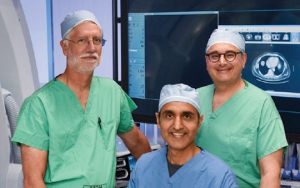ACE here is not the winning card. Adverse Childhood Experiences “are any stressful or traumatic events that occurred in childhood.” The experiences include sexual and physical abuse and neglect, but also household and family dysfunction, such as witnessing domestic violence or substance abuse.
Adverse events also include parental separation, divorce, or parental incarcerations. Emotional abuse or neglect, including separation, appear to be a significant as physical abuse.
A child can feel neglected and uncared for even when the separation is out of the parent’s control. Whenever a child, be they infant or toddler, or older, experiences emotional or physical abandonment or both, the reasons are superfluous. The result is the same. Such children have suffered trauma and the younger the child is, the deeper the wounds.
Now, with research in neuroscience becoming more able to pinpoint parts of the brain that are affected by such traumatic experiences, we can know that the neurological development of children is indeed profoundly affected. What affects our physiology — our brains and bodies—can be expressed behaviorally. ACE is one test that has corroborated the effects into adulthood.
Adverse Childhood Experiences study results were first published in 1998, and it was determined that there is “a stunning link between childhood trauma and the chronic diseases people develop as adults, as well as social and emotional problems.”
Find the ACE test below and remember that the ACE is only a guideline. Some of us experience toxic stress later in life. We must also remember that there are antidotes to these stressors. Emotional support, community, connection, psychotherapy, and other healing techniques can counter many of the negative effects of toxic stress. Resilience can build throughout life, says Dr. Jack Shonkoff, Director of the Center on the Developing Child at Harvard University.
A high ACE score is not the whole story—nor the bottom line. We hope for the caring people who are there for us in difficult times. Was there a trusted teacher? A loving grandparent? A special aunt? These are the helpers who may “mitigate the long term effects of early trauma.” (NPR, Health-Shots, 3/2/15
As Mr. Rogers would say, “Look for the helpers.”
See:
- www.npr.org/sections/health-shots/2015/03/02
- www.samhsa.gov/capt/practicing-effective-prevention/prevention-behavioral-health/adverse-childhood-experiences
- acestoohigh.com/category/epigenetics/
- acestoohigh.com/got-your-ace-score/, from which the following ACE test was taken:
Prior to your 18th birthday:
- Did a parent or other adult in the household often or very often swear at you, insult you, put you down, or humiliate you or act in a way that made you afraid that you might be physically hurt?
- Did a parent or other adult in the household often or very often push, grab, slap, or throw something at you? or Ever hit you so hard that you had marks or were injured?
- Did an adult or person at least 5 years older than you ever touch or fondle you or have you touch their body in a sexual way, or attempt or actually have oral, anal, or vaginal intercourse with you?
- Did you often or very often feel that no one in your family loved you or thought you were important or special, or your family didn’t look out for each other, feel close to each other, or support each other?
- Did you often or very often feel that you didn’t have enough to eat, had to wear dirty clothes, and had no one to protect you, or your parents were too drunk or high to take care of you or take you to the doctor if you needed it?
- Were your parents ever separated or divorced?
- Was your mother or stepmother:
Often or very often pushed, grabbed, slapped, or had something thrown at her? Or sometimes, often, or very often kicked, bitten, hit with a fist, or hit with something hard or ever repeatedly hit over at least a few minutes or threatened with a gun or knife? - Did you live with anyone who was a problem drinker or alcoholic, or who used street drugs?
- Was a household member depressed or mentally ill, or did a household member attempt suicide?
- Did a household member go to prison?
Your ACE score is the number of ‘yes’ answers to the above ten questions.
About Kayta Gajdos
Dr. Kathleen Curzie Gajdos ("Kayta") is a licensed psychologist (Pennsylvania and Delaware) who has worked with individuals, couples, and families with a spectrum of problems. She has experience and training in the fields of alcohol and drug addictions, hypnosis, family therapy, Jungian theory, Gestalt therapy, EMDR, and bereavement. Dr. Gajdos developed a private practice in the Pittsburgh area, and was affiliated with the Family Therapy Institute of Western Psychiatric Institute and Clinic, having written numerous articles for the Family Therapy Newsletter there. She has published in the American Psychological Association Bulletin, the Family Psychologist, and in the Swedenborgian publications, Chrysalis and The Messenger. Dr. Gajdos has taught at the college level, most recently for West Chester University and Wilmington College, and has served as field faculty for Vermont College of Norwich University the Union Institute's Center for Distance Learning, Cincinnati, Ohio. She has also served as consulting psychologist to the Irene Stacy Community MH/MR Center in Western Pennsylvania where she supervised psychologists in training. Currently active in disaster relief, Dr. Gajdos serves with the American Red Cross and participated in Hurricane Katrina relief efforts as a member of teams from the Department of Health and Human Services' Substance Abuse and Mental Health Services Administration.Now living in Chadds Ford, in the Brandywine Valley of eastern Pennsylvania, Dr. Gajdos combines her private practice working with individuals, couples and families, with leading workshops on such topics as grief and healing, the impact of multigenerational grief and trauma shame, the shadow and self, Women Who Run with the Wolves, motherless daughters, and mediation and relaxation. Each year at Temenos Retreat Center in West Chester, PA she leads a griefs of birthing ritual for those who have suffered losses of procreation (abortions, miscarriages, infertility, etc.); she also holds yearly A Day of Re-Collection at Temenos.Dr. Gajdos holds Master's degrees in both philosophy and clinical psychology and received her Ph.D. in counseling at the University of Pittsburgh. Among her professional affiliations, she includes having been a founding member and board member of the C.G. Jung Educational Center of Pittsburgh, as well as being listed in Who's Who of American Women. Currently, she is a member of the American Psychological Association, The Pennsylvania Psychological Association, the Delaware Psychological Association, the American Family Therapy Academy, The Association for Death Education and Counseling, and the Delaware County Mental Health and Mental Retardation Board. Woven into her professional career are Dr. Gajdos' pursuits of dancing, singing, and writing poetry.
- Web |
- More Posts(250)



Comments